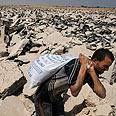
Scavengers collect rubble of Gaza's bombed airport
Looting reflects situation in Strip, where three-year blockade has made jobs scarce and kept out badly needed building supplies
Scores of men swinging hammers and pickaxes attack the runway and terminal of Gaza's bombed-out airport before dawn every day, scavenging gravel and metal bars to resell as construction material.
The looting of the Gaza International Airport — once hailed as a step toward Palestinian statehood but destroyed during years of fighting with Israel — reflects the dire situation in the impoverished territory, where a three-year blockade has made jobs scarce and kept out badly needed building supplies.
The scavengers who come daily, working long hours to take home as little as $15 a day, say they can't find other jobs.
"I have no work but to spend my day under the sun trying to feed my children," said Hilmi Izawied, 34, taking a break from work on Monday.
Despite the 98-degree Fahrenheit (37 Celsius) heat, about 120 men worked in the area Monday, some digging up gravel, others hammering on what were once terminal walls to remove bars. Many refrained from food or drink in observance of the dawn-to-dusk fast of the Muslim holy month of Ramadan, which began last week.
Izawied and four friends had been there since 3 am, he said, pulling up heavy slabs of runway asphalt, digging up the gravel below and filtering it into large sacks. Come evening, they would sell about five tons of gravel to merchants at the airport's entryway. They usually earn about $30 each for a day of backbreaking work, he said.
Izawied, a father of six, said he used to earn more as a mechanic in an industrial zone in northern Gaza that Israeli airstrikes have also reduced to rubble. Many working at the airport used to scavenge at the industrial zone until they ran out of rubble.
Israel and Egypt imposed a strict blockade on Gaza after Hamas violently seized control of the strip in 2007. Israel has recently loosened restrictions on goods that can enter Gaza, but has continued to exclude building materials, fearing the Islamic militants of Hamas will use them to build bunkers.
This has prevented Gazans from repairing the thousands of buildings that were damaged or destroyed in Israel's offensive against Hamas during the winter of 2008-9. Many of Gaza's factories were also damaged, further increasing unemployment.
Israel says it struck civilian areas because Hamas fighters took cover in them.
wa.jpg)
Digging through former runway of Gaza's bombed-out airport (Photo: AP)
The scavenged materials are mixed with cement smuggled into Gaza through tunnels under the Egyptian border. While fine for smaller repairs, the quantities don't permit large building projects.
Israel has said it would allow construction materials in for projects supervised by international bodies like the United Nations, and a few shipments of such goods have been delivered to Gaza.
The fate of Gaza's airport reflects the territory's decline over the last decade. At its festive opening in 1998, the late Palestinian leader Yasser Arafat flashed a victory sign from the runway as each of the first seven flights touched down. "This is a preparation for the declaration of the Palestinian state," he said at the time.
Seeking refuge from sun
In the late 1990s, the $75 million facility had a Moroccan-themed passenger terminal, a VIP lounge and a runway long enough to receive all but the biggest jumbo jets.
Its last flight left in 2001, a year after the outbreak of the second Palestinian uprising against the Israeli occupation. Israeli forces later shelled the airport, positioned tanks inside and knocked down its outer wall and air control tower.
They have regularly bombed it since militants linked to Hamas captured an Israeli soldier in 2006, badly damaging the terminals and most of the runway.
Gaza looters — including women and children as young as 14 — have followed each step in its destruction, first hauling off doors, tiles, windows and air conditioners and now coming for the metal in the walls and gravel under the tarmac.
Gaza's other sites have been mostly picked clean, making the airport Gaza's final scavenging frontier, with the largest number of workers turning out there on any given day.
Last month, the UN prevented scavenging at the site for about two weeks to prepare for an event at which more than 7,000 children simultaneously dribbled basketballs on an intact part of runway in an attempt to enter the Guinness Book of World Records.
After the event, the workers dug up that strip too, leaving behind a vast field of broken chunks of asphalt.
Seeking refuge from the midday sun under a destroyed terminal on Monday, Rami Abu Warda, 23, and a group of other workers calculated their profits.
After subtracting their costs for transportation and equipment rental, Abu Warda handed each man his share: just under $15.
"This is a blessing from God," he said, slipping his cut into his wallet.
- Follow Ynetnews on Facebook










